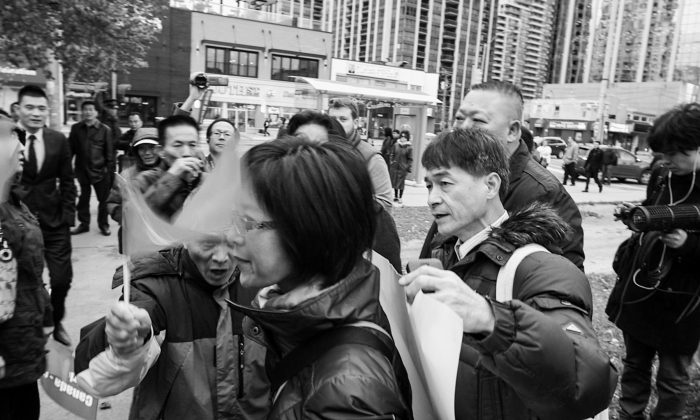Can making a film in a peaceful country at a peaceful time feel like going to war? For Doris Liu, director of the documentary “In the Name of Confucius,” the answer is “yes.”
The 52-minute award-winning documentary was screened at the 38th Annual Conference of the North America Taiwanese Professors’ Association in Washington on Aug. 4. It has not yet been released to theaters.
In the film, the camera captures this scene: Two groups of people, both of which are mainly Chinese, are confronting each other, with one group waving Chinese red flags and fiercely shouting slogans such as “Down with the Tibetan independentists!”
Among these fiercely shouting men was the slim-built Doris Liu. These men bluntly show their anger toward her and order her to “get out of here.” They didn’t like the fact that she had a cameraman with her and he was obviously filming.

The confrontation became so intense that Liu’s soundman, an international student hired by Liu to hold a long boom pole to collect the sound for the scene, kept his distance. He had never seen anything like this before.
Those were just a few of the difficulties Liu encountered when she tried to make the film, which the Accolade Global Film Competition described as “an exposé filled with shocking details, odious intentions, and an everyday hero who exposes the truth behind a multibillion-dollar enterprise.”
‘Confucius Institutes’
The “enterprise” is the Confucius Institutes (CI), which have found their way into more than 1,600 universities and schools worldwide since their inception in 2004.
The CIs are an important part of the Chinese Communist regime’s “soft power” and “external propaganda” strategy. (A more internationally tailored translation for “external propaganda” would be “international publicity.”)
Liu, a Toronto resident, didn’t know much about the CI until 2013, when the Globe and Mail published a story about Sonia Zhao, a former CI instructor, who defected and filed a discrimination complaint against CI.
Since Zhao lived just about a 90-minute drive away, Liu became interested in finding out more.
Zhao practices Falun Gong, a spiritual practice that involves doing five meditative exercises and living according to the principles of truthfulness, compassion, and tolerance. It was banned in China in 1999 and has been brutally persecuted since.
Liu saw Zhao’s contract with CI, which clearly stated that to be an instructor for CI, one should and could not practice Falun Gong. By speaking out, Zhao exposed the political agenda of CI to the world.
It was also CI’s policy to avoid topics in the classroom such as the Tiananmen Square massacre, Tibet, and Falun Gong. For Liu, who chose to leave China and migrate to Canada in 2005, the “party line” of CI was very obvious.
Battle in Toronto
In 2014, when Canada’s largest school board, the Toronto District School Board (TDSB), was about to open the world’s largest Confucius Institute, there was an unprecedented level of public outcry. Opponents and supporters of CI confronted one another fiercely, with Liu and her TV crew caught in the middle, almost physically attacked by the CI supporters, who didn’t appreciate being filmed.
“It was like a battleground outside the TDSB Education Centre in Toronto. People have never been so divided. However, the majority of both the opponents and supporters of CI were Chinese people from Mainland China.“It suddenly struck me that this battle was about Canadian values, which Canadians might have taken for granted,” Liu said.

“For people who left China to seek freedom and democracy, when they found such a thing like CI had been ‘exported’ to Canada, they realized that they needed to continue the fight to gain what they had been longing for. Good and wonderful things are not easy to gain, and people have to fight and hold fast to them,” she added.
The filming process was like a battle, too. Apart from intense public confrontations, securing and filming interviews with CI officials was also challenging. As soon as sensitive questions were asked, Liu and her crew could be shown the door.
Sometimes, her cameraman was too afraid of the confrontation and suddenly asked for a “leave.” She had to not only urgently find other cameramen, but also give them a very detailed “battle plan” about what to do if confrontations did break out during the interview, and the instruction was “keep on recording, no matter what.”
That’s how audience members are able to see some of the rare scenes in the film “In the Name of Confucius.” Liu said without the “backup” of a few of her very brave former colleagues who once did the filming for her, she would never have been able to preserve all the difficult interviews and present the real scenes to her global audience.
While more and more people from different countries recently have awakened to the hidden agenda behind the “free gifts” of the CI, Liu noticed a new, worrying trend: After realizing that as the CI has raising more and more doubts and encountering more and more problems, the Chinese regime is now trying to do the same things that the CI has been doing, but without hanging a CI sign.
Liu said the world must guard against this.
On Aug. 1, three days before the most recent screening of “In the Name of Confucius,” the U. S. Senate passed the National Defense Authorization Act for Fiscal Year 2019, which limits funding for colleges with CI branches.
With the Confucius Institutes explicitly mentioned and included in the new national defense bill, one might say that Liu is justified to feel that making a film about CI was like going to war.
Watch Next:
“I Was a Communist Slave”
A story of tragedy, faith, and resistance in the face of brutal totalitarianism, Memoir of a Communist Slave is one man’s journey to uncover what he believes has held him and his people hostage for too long.

